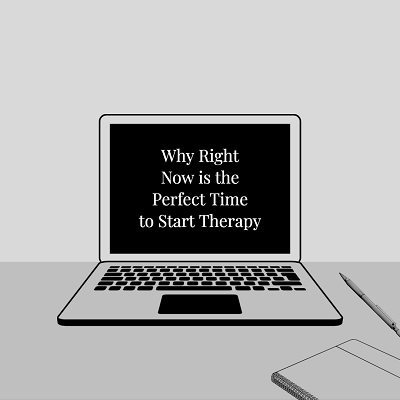Why Right Now is the Perfect Time to Start Therapy
Why Right Now is the Perfect Time to Start Therapy

I’ve heard from friends countless times that they have considered therapy, but their lives were just too busy for it. Maybe when they had more time, they’d say.
What better a time than now, when you’re safe at home 24/7, and likely anxious about the world’s current state?
Due to the stay-at-home order in most of the world, therapy is being done virtually, called teletherapy. Like anything that has transitioned from in-person to online, it can be strange at first. Here you can read a great article on what to expect from this format.
As a therapist conducting therapy virtually, as well as a current client of such, I can safely say no, it is not the same. There is something about being vulnerable with another person in-vivo that isn’t perfectly translated over screens (like with most interactions). Still, I would say it is much better than not doing it at all, or continuing to put it off for when the “time is right.”
I am a marriage and family therapist, so I am biased towards having more people in the therapy room. Research has shown that family-based interventions are as effective—and in many cases more effective—than alternative modalities of therapy (such as individual), and often at a lower cost. Often, the obstacle of seeking therapy for the whole family is time and location. It can be headache-inducing to find a regular time for everyone to meet when there are irregular job schedules, school, after-school programs etc. For most people right now, those barriers have been lifted.
The same idea goes for couples therapy. According to well-known relationship and marriage expert Dr. John Gottman, couples wait an average of six years of being unhappy before getting help. Gottman adds, “Couples have six years to build up resentment before they begin the important work of learning to resolve differences in effective ways.” Why wait on addressing one of the most, if not the most important relationship in your life?
I especially recommend that those working on the front lines against COVID-19 seek therapy now. In my blog, Life in the Time of Quarantine, I’ve had the pleasure of interviewing working individuals most affected by the pandemic. One respiratory therapist shared that she worries about the trauma experienced by healthcare workers after all that she has seen in the hospital. Most therapists are doing free or low-cost sessions for these individuals. You can find this here.
It can be cumbersome to find a therapist. I recommend starting with ADAA’s Find a Therapist tool to search in your area. This way, you may have the option to continue your treatment in person once the social distancing order is lifted. Also, Psychology Today’s search engine is great to filter by your insurance provider. Currently, some health insurance providers are waiving co-pay fees, and responding to the pandemic in other ways to help make therapy possible. You can read what your specific provider is doing here.
No insurance? There are options for therapy you can read about here.
Therapy isn’t for everyone, but it can be a powerful process for those who fully engage in it. If you haven’t considered therapy before, 1) thanks for clicking this article! 2) head to this article on the top 5 reasons to see a therapist. If one or more of those reasons resonate with you, it may be time to try something new. Still not sure? Here are some reasons why highly successful people seek therapy.
Regardless of the modality you choose, it is simply just a good time for it.
Many of my clients have shared that they wish they would have started therapy earlier. Some waited several years before finally requesting their first appointment. Do it now, and you’ll thank yourself later.











